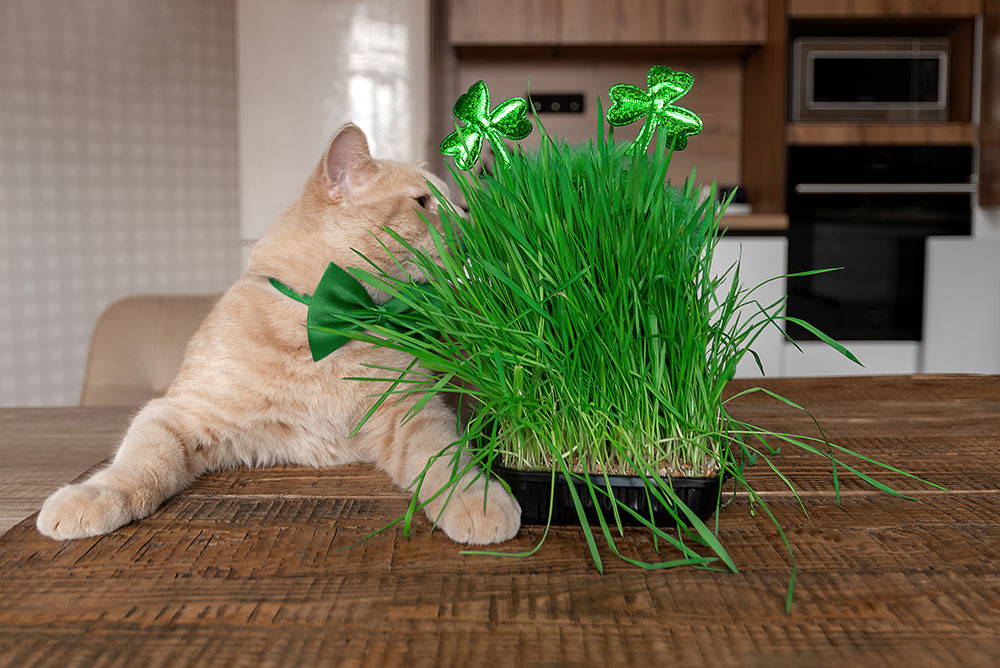
Ruth D.
Mar 16,2023
All You Need to Know about Cats and Wheatgrass
If you have a cat, you probably know that they like to nibble on grass. Although they usually spit it out after a few minutes, scientists have always been interested in why they do it in the first place. Cats are carnivores, but don't let the fact that cats eat grass surprise you. Our felines can eat and draw nutritional benefits from plants.
We know they love to eat grass they find outside, but can cats eat wheatgrass? The answer is - yes, they can, and we will write about all the reasons why a cat should eat wheatgrass.

What Does Wheatgrass Contain?
Wheatgrass is rich in chlorophyll, vitamins, and minerals and has a high level of plant protein. Wheatgrass contains vitamins A, E, and C, selenium, fiber, and carotene.
Benefits of Wheatgrass for Cats
There are several benefits of wheatgrass for cats. As strange as it may seem, grass has several roles in a cat's diet:
Wheatgrass is an excellent source of folic acid - Folic acid is essential for the proper functioning of the cat's body and helps produce hemoglobin. After mother's milk, the grass is the cat's most significant source of this acid.
Wheatgrass contains essential vitamins - Some of your cat's most important vitamins are E and B. Vitamin E contains antioxidants that prevent heart disease and increases your pet's immune system. B vitamins, especially B3 and B12, can speed up your kitty's metabolism and provide healthy skin and coat.
Natural laxative - The fiber in wheatgrass stimulates your feline's digestion as a natural laxative that breaks down several constipation culprits.
Every cat owner knows this, and you have probably encountered these "traces" around the apartment. Namely, it is known that cats are excellent cleaners and mainly care for their hygiene and their fur. During these grooming sessions, the cat swallows balls of hair that she expels only by coughing and vomiting.
Wheatgrass helps cat digestion and stimulates the urge to vomit, which is the best way to get rid of swallowed hairs, undigested parts of food, or some foods it does not like.

How Long Does Wheatgrass for Cats Last?
The average lifespan of wheatgrass for cats is about 2-3 weeks, depending on different factors such as temperature, humidity, etc.
Important Note: Consider growing the wheatgrass yourself to ensure no chemicals are in it. Pesticides and herbicides on outdoor grasses can be toxic to your cat.
Side Effects of Wheatgrass
Cats overeating wheatgrass at once can cause gastrointestinal upset and vomiting. Cats lack the digestive enzymes to break down plant material like humans.
Start offering small amounts of wheatgrass, or let your kitty eat it only for a few minutes.
Conclusion
Wheatgrass for cats has become very popular in the last few years. Cats receive many potential health benefits when they eat it. Being rich in antioxidants, chlorophyll, vitamins, and minerals, wheatgrass has become a nutrient-dense food for your little pet.
Disclaimer
Information on this Website is provided for educational purposes only and is not intended as a substitute for the advice provided by your veterinarian or other healthcare professional. You should not use the information on this Website for diagnosing or treating a health problem or disease or prescribing any medication or other treatment. You should always speak with your veterinarian or other healthcare professional before taking any medication or nutritional, herbal or homeopathic supplement, or adopting any treatment for a health problem.
Disclaimer
Information on this Website is provided for educational purposes only and is not intended as a substitute for the advice provided by your veterinarian or other healthcare professional.
Continue to full version.
You should not use the information on this Website for diagnosing or treating a health problem or disease or prescribing any medication or other treatment. You should always speak with your veterinarian or other healthcare professional before taking any medication or nutritional, herbal or homeopathic supplement, or adopting any treatment for a health problem.

